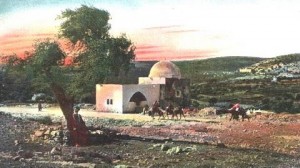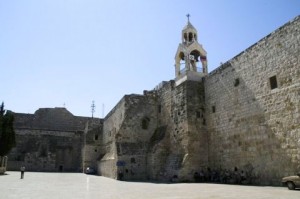Jesus was born in the little Judean town of Bethlehem. Even in ancient times it was almost a suburb of Jerusalem, being only five miles (8 kilometers) away, and it certainly is much like a suburb today, although it is now part of the Palestinian Authority. Jesus’ birth in Bethlehem was in answer to a prophecy made some seven hundred years before by Micah. It is one of the most astounding prophecies in the Bible. Micah 5:2 says: “But you, Bethlehem Ephrathah, though you are small among the clans of Judah, out of you will come for me one who will be ruler over Israel, whose origins are from of old, from ancient times” (cf. Mt. 2:1-2; Lk. 2:4-7). This prophecy assures us that the Messiah was to be born in Bethlehem and that his origins were ancient and unsearchable. How appropriate that the Messiah, the miraculous and eternal spiritual food for his people, was born in Bethlehem, whose Hebrew name means “house of bread.”
BETHLEHEM- THE BIBLICAL HERITAGE
The little town of Bethlehem has a biblical heritage reflecting both great sorrow and great joy. We read in Genesis 35:19 that Jacob lost his beloved wife, Rachel, as she died giving birth to Benjamin. The place of her death was on the outskirts of Bethlehem (Gen. 48:7). Her tomb has stood beside the Bethlehem Road for many centuries and is a favorite place of prayer to this day for the women of Israel.
In 1 Chronicles 4:4, we see that Ephrathah or Ephrath was the wife of Caleb, mother of Hur and great ancestor of many of Bethlehem’s early residents. As we observe in Micah’s prophecy, her name has become attached to the city. The blessed story of Ruth and Boaz also has its setting in the fields of Bethlehem. In the Book of Ruth we learn that she and Boaz were in fact the great grandparents of King David. So Bethlehem became his home as well and the place where Samuel anointed him as the future king of Israel (1 Sam. 16:13). Bethlehem is actually called the “City of David” in Luke 2:4. A couple of David’s mighty men, Elhanan and Asahel were from Bethlehem as well (2 Sam. 23:24; 2:32).
Of course the crowning event in all of Bethlehem’s history was the birth of Jesus. Mary and Joseph had traveled from Galilee back to their home country in order to register for taxation according to Roman decree and while they were there Jesus was born. He was born in a stable because there was no room in the local inn. On that night the angel announced the glad tidings found in Luke 2:10-11: “Do not be afraid. I bring you good news of great joy that will be for all the people. Today in the town of David a Savior has been born to you; he is Christ the Lord.”
Long tradition, all the way back to the second century, has it that the manger where the baby lay was actually situated in a cave. Today under the Church of the Nativity there is a cave which is revered as the very spot where Jesus was born. In fact, there is a network of caves under the church.
Bethlehem suffered a tragic and sad event after Jesus was born. In his mad attempt to kill the baby Jesus, King Herod had all the young male children of the area murdered (Matt. 2:16). In a deep spiritual sense Mother Rachel was left weeping for her children because they were no more (Jer. 31:15; Matt. 2:18).
BETHLEHEM THROUGH HISTORY
In the early fourth century the Roman Empire became officially “Christian” with the conversion of Constantine and his rise to power. Almost immediately Constantine’s mother, Helena, came to the Holy Land and began to construct great churches marking spots of the major biblical events. By 330 the Church of the Nativity in Bethlehem was built. Later, the great Bible scholar Jerome with some assistance from local Rabbis translated the Bible which became known as the Latin Vulgate. Tradition says that after thirty years of laboring on his project he was buried in the vicinity of the church.
In its early stages the Bethlehem church was fairly small and was later damaged seriously in an uprising. In 529 the Emperor Justinian expanded the building to its present form. The church miraculously survived the devastating Persian invasion of 614 and was likewise spared destruction by the Moslems as the Crusaders took over the Holy Land in 1099. The old church, perhaps the oldest continuing Christian church in the world, has survived war, earthquake and fire and still stands today. She even survived the humiliating and nationally televised takeover by Islamic radicals in 2002.
Through all these centuries the church has remained an important Christian shrine. For most of the last two millennia the residents of Bethlehem have been predominately Christian. Many made their living in the numerous olive wood shops and other curio shops and restaurants around Manger Square.
Today because of the bewildering and confusing politics of Middle East, Bethlehem, which came under Israeli administration in 1967, was given to the Moslem Palestinian Authority in 1995. All this was part of the Oslo Peace Accords. Due to the resulting rise in Moslem persecution there is a sudden and drastic decline in the Christian Arab population, which has now shrunk to less than 20 percent.
IS RACHEL STILL WEEPING?
It appears that the days of Rachel’s weeping are not ended. The same can be said of Bethlehem’s weeping. Her nativity celebrations are now muted as thousands of Christian residents have fled the land. Due to the ugly and vicious Middle East politics the Jewish people are certainly not welcome in the city either. Rachel must still be weeping for them as well.
Several years ago a number of us from Jerusalem were part of a singing group. One of our performances was on Christmas Eve at Bethlehem. As a part of the Christmas season the Israeli government had encouraged choirs from the area and from other parts of the world to join in the program. It was a blessed opportunity of a lifetime. One of our performers was Liz Kopp, who is the pastor’s wife and pianist at Narkis Street Congregation in Jerusalem. Liz wrote and sang this beautiful, sorrowful but at the same time hopeful arrangement.
O little town of Bethlehem
How still we see thee lie
Mid broken dreams and silent screams
Carried through the nightPain shatters your peaceful skies
Tears fill up your streams
Love is lost when your heart no longer believesO little town of Bethlehem
How still you are tonight
Behind your walls you bury hope
And lose site of that star
That would lighten your darkened path
And show you the way
To the One who can set your spirit freeO little town of Bethlehem
Chosen village foreseen
O little town of Bethlehem
City of the King
We wait for you
We pray for you
To let Him in again
-Jim Gerrish
Article publication date, December 2007
Picture credits, Wikimedia Commons


